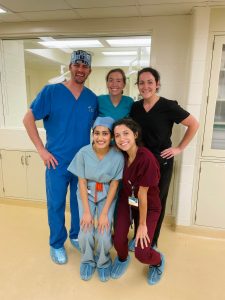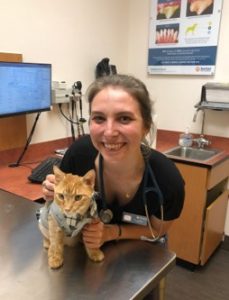Resources for students interested in health careers:

UNCG supports students who are planning to pursue a graduate degree in a health-related field such as medicine, dentistry, physician assistant, physical therapy, occupational therapy, pharmacy, veterinary medicine, optometry, genetic counseling, and many more. Those preparing for competitive applications to these fields should declare an interest track in the appropriate pre-health field while also completing a bachelor’s degree in a major of their choice.
If you are interested in a health-related professional school after you graduate from UNCG, but you have not yet declared the pre-professional interest track of your choice, you may do so through this form.
All students with one of these declared Pre-professional interest tracks will be automatically enrolled in the Pre-Professional Programs (ORG) group in Canvas, which is how information is provided and announcements about upcoming events are communicated.
Pre-professional students will also be assigned a second, pre-professional advisor to assist them in ensuring that students are meeting the academic and extracurricular requirements to build a competitive application to the professional school of their choice.
If you do not yet have an assigned pre-professional advisor, you may set up an appointment with either the Chair (Robin Maxwell) or Assistant Chair (Jeremy Ingraham).
Ms. Maxwell: CLICK HERE
Dr. Ingraham: Please email jpingrah@uncg.edu to inquire about an advising appointment.
Health related professional graduate programs require a core of courses (“prerequisites”) that must be completed with strong grades (mostly grades of A and only a few B grades) before admission. They can be successfully incorporated into almost any major. The choice of major does not significantly affect the student’s probability of admission to a given professional graduate school. Students should give consideration to any major that they find interesting and in which they excel. The admission requirements vary among professional schools, even within the same discipline. For specific information, students should review the websites of the schools to which they are interested in applying.
The achievement of outstanding academic credentials should not be accomplished at the expense of sacrificing extracurricular activities. Equally important in a competitive application is involvement in activities that demonstrate core values and skills that will make a student an effective practitioner of the profession.
Professional programs prefer students who are well-rounded and have actively pursued diverse interests, especially in these areas:
- Leadership; which may be gained through mentoring, tutoring, supervising, teaching, training, or holding offices or positions on or off campus that require organizing and delegating tasks to others.
- Volunteerism in the form of service to under-served populations; often demonstrated through regularly spending time at food pantries, homeless shelters, refugee assimilation organizations, crisis counseling, with victims of domestic abuse, foster homes, at-risk youth, HIV positive individuals, or any other way to spend time helping those less fortunate than themselves.

- Accumulating significant, longitudinal clinical or health-related experiences. Dental schools in particular require evidence of a hobby or job where you have developed hand-eye coordination and fine motor skills and shadowing dentists. Physician assistant programs require shadowing and direct patient contact hours. Physical therapy and occupational therapy require shadowing at different types of sites. Medical schools prioritize paid medical experience as CNA, EMT, phlebotomists, patient care associates, etc. Veterinary medicine schools require certain numbers of veterinarian and animal contact hours.
Please also read the following FAQs about Health Career Advising: Health Career FAQs
Important Organizations for Students Pursuing Health Careers
MAPS: Minority Association of Pre-med Students
UNCG Dental Club
SPECS: Spartans Pursuing Eye Care Science (Pre-Optometry Club)
Pre-Vet Student Association
Members of the Health Careers Advisory Committee
Robin Maxwell, Biology (Chair);
Jeremy Ingraham, Biology (Co-Chair);
Joe Bundy, Biology;
Jessica Caporaso, Psychology;
Norman Chiu, Chemistry/Biochemistry (Pre-Pharmacy only);
Jennifer Clark, School of Health and Human Sciences Advising Center;
Erin Fox, School of Health and Human Sciences Advising Center;
Ashleigh Gallagher, Psychology;
Mark Hens, Biology;
John Lepri, Biology;
Karen Katula, Biology;
Kimberly Miller, Community and Therapeutic Recreation (Pre-Occupational Therapy only);
Ron Morrison, Nutrition;
Pradyumna Pradham, Chemistry/Biochemistry;
Promod Pratap, Physics;
Jason Reddick, Chemistry/Biochemistry;
Candie Rumph, Biology;
Randy Schmidtz, Kinesiology (Pre-Physical Therapy only);
Caitlin Saraphis, CASA;
Casey Taylor, Biology;
Aaron Terranova, Kinesiology


